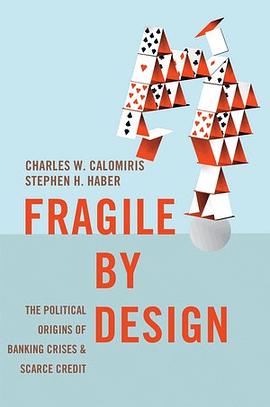Fragile by Design
内容简介
Why are banking systems unstable in so many countries--but not in others? The United States has had twelve systemic banking crises since 1840, while Canada has had none. The banking systems of Mexico and Brazil have not only been crisis prone but have provided miniscule amounts of credit to business enterprises and households. Analyzing the political and banking history of the United Kingdom, the United States, Canada, Mexico, and Brazil through several centuries, Fragile by Design demonstrates that chronic banking crises and scarce credit are not accidents due to unforeseen circumstances. Rather, these fluctuations result from the complex bargains made between politicians, bankers, bank shareholders, depositors, debtors, and taxpayers. The well-being of banking systems depends on the abilities of political institutions to balance and limit how coalitions of these various groups influence government regulations.
Fragile by Design is a revealing exploration of the ways that politics inevitably intrudes into bank regulation. Charles Calomiris and Stephen Haber combine political history and economics to examine how coalitions of politicians, bankers, and other interest groups form, why some endure while others are undermined, and how they generate policies that determine who gets to be a banker, who has access to credit, and who pays for bank bailouts and rescues.
......(更多)
作者简介
Charles W. Calomiris is the Henry Kaufman Professor of Financial Institutions at Columbia Business School and a professor at Columbia's School of International and Public Affairs. His many books include U.S. Bank Deregulation in Historical Perspective.
Stephen H. Haber is the A. A. and Jeanne Welch Milligan Professor in the School of Humanities and Sciences and the Peter and Helen Bing Senior Fellow at the Hoover Institution at Stanford University. His many books include The Politics of Property Rights.
......(更多)
目录
Preface ix
SECTION ONE No Banks without States, and No States without Banks
1 If Stable and Effi cient Banks Are Such a Good Idea, Why Are They So Rare? 3
2 The Game of Bank Bargains 27
3 Tools of Conquest and Survival: Why States Need Banks 60
4 Privileges with Burdens: War, Empire, and the Monopoly Structure of English Banking 84
5 Banks and Democracy: Britain in the Nineteenth and Twentieth Centuries 105
SECTION TWO The Cost of Banker-Populist Alliances: The United States versus Canada
6 Crippled by Populism: U.S. Banking from Colonial Times to 1990 153
7 The New U.S. Bank Bargain: Megabanks, Urban Activists, and the Erosion of Mortgage Standards 203
8 Leverage, Regulatory Failure, and the Subprime Crisis 256
9 Durable Partners: Politics and Banking in Canada 283
SECTION THREE Authoritarianism, Democratic Transitions, and the Game of Bank Bargains
10 Mexico: Chaos Makes Cronyism Look Good 331
11 When Autocracy Fails: Banking and Politics in Mexico since 1982 366
12 Infl ation Machines: Banking and State Finance in Imperial Brazil 390
13 The Democratic Consequences of Infl ation-Tax Banking in Brazil 415
SECTION FOUR Going beyond Structural Narratives
14 Traveling to Other Places: Is Our Sample Representative? 451
15 Reality Is a Plague on Many Houses 479
References 507
Index 549
......(更多)
读书文摘
萧伯纳:“明智的人会去适应世界,而不明智的人只会坚持让世界适应配。因此进步总是由不明智的人推动的。” 民主政体中有益的改革需要有知识的、顽固的“不明智的人”。
......(更多)






